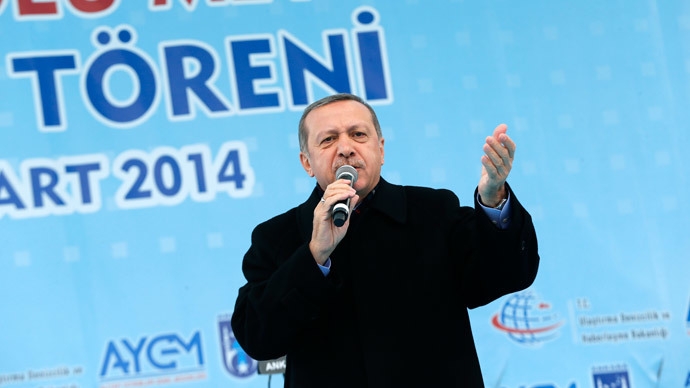Remembering Berkin Elvan: A wake-up call for Tayyip Erdogan?

Last year Turkey went through its very own 'summer of discontent' as a result of opposition to the refurbishments planned (and now executed) in the wider Taksim area of the city of Istanbul.
Protests erupted locally, focused on the Gezi Park section adjacent to the Taksim Square, and subsequently spread throughout the rest of the city and even throughout the whole of the nation.
At the time, I made the following observation: "The Guardian’s Richard Seymour ... rightly opines that these Gezi Park protests have 'become a lightning conductor for all the grievances accumulated against the [AKP] government'. Political scientist and Gezi Park protester Koray Galıskan told the international press “We do not have a government, we have Tayyip Erdogan,” adding that “They are not listening to us ... This is the beginning of a summer of discontent.”
The PM, displaying his usual swagger in the face of popular opposition and confident of his apparently God-given popularity, sufficed to declare on June 2, 2013, that "We cannot sit and watch a few hooligans coming to the square and provoking people. Because when the nation voted for us, they voted for us to guard our history.”
In the course of that fateful summer a number of people were injured or died as a result of the excessive force used by Turkey's Security Forces: the Turkish Medical Association (TTB) reported a total of 8,163 injured people (14 people lost an eye as a result of being hit by either tear gas canisters or rubber bullets) in addition to those who died. Their names have now joined the ranks of earlier victims of political repression in Turkey: Abdullah Cömert, aged 22, Ali İsmail Korkmaz, 19, Ethem Sarısülük, 27, İrfan Tuna, 47, Zeynep Eryaşar, 55, Ahmet Atakan, 22; but also the name of the Police Commissioner Mustafa Sarı, who died after a fall, should not be excluded.
In view of these sad names and figures, Amnesty International's verdict that, "From the start of the Gezi Park protests the Turkish authorities have – with isolated and brief exceptions – displayed a blatant disregard for the right to peaceful assembly as set out in international and national law.” And now, nine months later, while the government is embroiled in a corruption scandal of gigantic proportions, this "blatant disregard" has led to yet another fatality, a 15-year-old boy died on Tuesday, March 11.
"Berkin Elvan, then aged 14, was on his way to buy bread for his family when he got caught up in the street battles in Istanbul last June [2013]. He was hit in the head by a tear gas cartridge fired by the police and had been in a coma ever since,” as related by Constanze Letsch in the Guardian.

The deceased Berkin weighed just 16kg at the time of his death. Emma Sinclair-Webb, Human Rights Watch's senior Turkey researcher, declared recently that the "case of Berkin Elvan has become a symbol for Turkey's record of police violence and impunity.”
The boy's funeral cortege was held on Wednesday, and popular grief was met by police repression and violence abounded (and keeps abounding) throughout the whole of Turkey. Protesters fought with riot police in at least 15 cities after the news of the boy's death became public on Wednesday. Sinclair-Webb observes correctly that the “enormous outpouring of anger at these horrors is also due to the silence of the government on Berkin Elvan's death and on this issue in general.”
Against the backdrop of this popular agitation throughout the country, Turkey's erstwhile EU Minister Egemen Bagış made a public announcement via Twitter, stating that "these necrophiliacs" - referring to the protesters in support of Berkin Elvan - will get their comeuppance on March 30. Bağış has since removed this controversial tweet.
In contrast to his former minister, the generally quite vocal and outspoken Erdogan has remained conspicuously silent. On Thursday (March 13), while attending the opening of the Kızılay-Çayyolu Metro line in Ankara, Tayyip Erdogan made an ever-so-slight reference to the events now sweeping the country: "Yesterday, they burned our election office in Istanbul ... They are charlatans. They do not believe in the [ballot] box. And they will see what is coming to them. As they have already now recognized [what will happen to them on] March 30, they have said let's create chaos and we might get [our] result with chaos. But they won't.”
Selective grief?
The day of mourning and protest came to an end with the announcement of another young person's death. Burak Can Karamanoğlu died as a result of injuries sustained in the course of an altercation which became a fight with deadly consequences (on March 12).
Clearly shying away from directly pronouncing the dead boy Elvan's name or even referring to the enormous outpouring of grief throughout the whole of Turkey, Tayyip Erdogan persists in his usual dismissal of popular feelings of discontent with his rule. Instead he urges his supporters to come out in numbers on Election Day to teach the opposition a well-deserved lesson.
Taking his apparently polarizing discourse one step further, at a meeting organized in Aksaray on Thursday, Tayyip Erdogan declared that the extreme-left terrorist group DHKP-C had claimed responsibility for the death of Burak Can Karamanoglu. In this way, the PM is directly appealing to his grassroots supporters intimating that the ones responsible for the hapless boy Burak Can Karamanoglu's death are the ‘Revolutionary People’s Liberation Party/Front (DHKP/C)’, one of those "the secular, domestic groups who conduct acts of terror in the name of their chosen cause; in this case, the explicit ideological pursuit is the birth of a Marxist Turkey," as expressed by Kyle Brady, Graduate Student at the Regent University, Virginia Beach, VA.
Last year during the Gezi protests, the PM also drew his supporters' attention to numerous leftist organizations participating and supporting the protests. The AKP's main support after all consists of conservative Muslims traditionally opposed to any politician or position left of center, in a real throwback to Cold War politics. In addition, the memory of DHKP/C's deadly attack on the Sabancı Towers in Levent (Istanbul) on January 9, 1996, still lingers prominently in the Turkish population's collective memory.

On the other hand, critics of Erdogan point to one of the PM's now-notorious television appearances last year. As his ally Mohammad Morsi was being deposed by Field Marshal Abdel Fattah al-Sisi, the 17-year old Asmaa Al-Beltaji was shot and killed on the Rabea Al Adaweya square in Cairo during the army's attempts to disperse a six-week-old sit-in by force (August 14, 2013). The dead girl was a daughter of the Muslim Brotherhood leader Mohamed Al-Beltaji, one of Egypt's first-ever democratically-elected leaders.
Appearing on Turkish television after this tragic event, Erdogan read a letter written by the girl to her father. While reading her words, the Turkish PM was unable to contain himself and burst into tears, explaining afterwards that he was reminded of a note written by his own daughter when he was facing jail time. Now, his opponents question the prime minister's loyalties, indulging in public displays of grief over a dead Egyptian girl, but remaining silent in the face of the Turkish boy Berkin Elvan's equally tragic death.
Swimming against the tide
Protests in support of Berkin Elvan have spread throughout Turkey, transcending confessional lines and income barriers. The boy belonged to the Alevi minority in Turkey and was a member of Turkey's low-income social classes. Turkey’s Alevi (or Turkey's very own Alawite variety of Islam) community is estimated to consist of 15 to 20 million members and their creed is very unlike the strict Sunni Islam (pertaining to the Hanafi madhhab or school of law) advocated by the PM and the AKP. Even Turkey's universally-loved pop star Sezen Aksu, a woman well-known for her personal piety and sympathetic stance toward the AKP government, has now come out in support of Berkin Elvan, having penned a heartfelt letter posted on her personal website. Other supporters launched a crowd funding campaign online in order to be able to honor Berkin Elvan with a full-page obit in the New York Times. The targeted goal of raising $57,000 was easily reached in just over one day and "Berkin’s commemoration will be published by the New York Times on Friday, March 14, 2014".
In the end, it seems that the beleaguered prime minister really seems have his work cut out now if he wants to hang on to power in the coming months. Opposition to his rule has now reached truly global proportions. Last January, the "outspoken Israel Lobbyists" Morton Abramowitz, Eric Edelman and Blaise Misztal penned a letter in the Washington Post which, according to the well-known whistleblower Sibel Edmonds, was a clear appeal to "the Obama Administration to overthrow the current Turkish administration," led by Tayyip Erdogan.
The Washington Post missive ends with this ominous paragraph: "Erdogan is doing great harm to Turkey’s democracy. The United States should make clear, privately and publicly, that his extreme actions and demagoguery are subverting Turkey’s political institutions and values and endangering the US-Turkey relationship."
In the end, one can but wonder about such claims and their relationship to reality. After all, the PM himself is always blaming outside forces for his woes, giving them ever more colorful names, from the "Interest Rate Lobby" to more recently a "Robot Lobby" using the social networking site Twitter for nefarious ends. Against this backdrop, the Hizmet Movement led by Fethullah Gülen has also recently declared its support for the opposition CHP or Republican People's Party.
Writing in the Gülen-affiliated daily Zaman, the journalist Şahin Alpay announced his decision to cast his ballot for the opposition setting an example for his readers who are more likely than not to heed the words of their ‘master lord’, the self-exiled Fethullah Gülen.
The end of the month is now approaching with rapid steps and the outcome of the local elections might just prove to be a sign of things to come.
The statements, views and opinions expressed in this column are solely those of the author and do not necessarily represent those of RT.
The statements, views and opinions expressed in this column are solely those of the author and do not necessarily represent those of RT.













